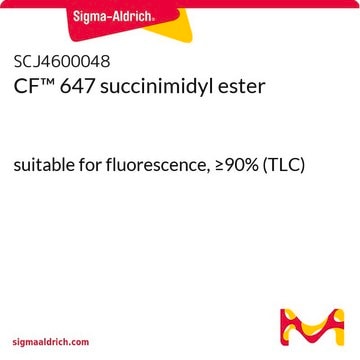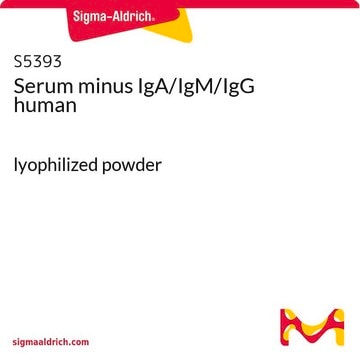SBVT15
SB-MRP3-HEK293
Sinonimo/i:
ABC31, MLP2, MRP3, MRP3 human membrane vesicles, Multidrug resistance protein 3
Autenticatiper visualizzare i prezzi riservati alla tua organizzazione & contrattuali
About This Item
Codice UNSPSC:
12352202
Prodotti consigliati
Forma fisica
liquid
Concentrazione
5 mg/mL
Condizioni di spedizione
dry ice
Temperatura di conservazione
−70°C
Informazioni sul gene
human ... ABCC3(8714)
Descrizione generale
Membrane Preparations for Vesicular Transport Assays (VT) are suitable for general drug-efflux transporter interaction studies. Both substrate and inhibitor interactions can be assessed using vesicles. The success of substrate interaction studies strongly depends on the passive permeability of the compound. High permeability substrates might not be detected. Control Membranes with no-, or significantly lower transporter activity are also available.
Applicazioni
In the vesicular transport assay so-called "inside-out" membrane vesicles containing ABC transporters are applied. Incubating substrates of the respective efflux transporter in the presence of the inverted membrane vesicles and ATP will allow measuring accumulation of the substrates into the vesicles. In many cases radiolabeled reporter substrates are used but recently SOLVO developed the new PREDIVEZ Vesicular Transport Kits that use fluorescent reporter substrates.
The standard vesicular transport assay is an inhibitory assay performed with cold test articles. This assay provides information on any interaction between the ABC transporter and the test article. The transport of the reporter substrate is measured in the presence of the test article (typically in 7 concentrations) and IC50 is defined as the concentration inhibiting the transport of the reporter substrate by 50%.
Should radiolabeled form of the investigated compound or adequate analytical methods (LC/MS, HPLC) be available, the vesicular transport assay may be performed in a direct format without the reporter substrate and may identify substrate nature of the test article. The vesicular transport substrate assay is a low throughput assay. It is suitable for low permeability test compounds as high permeability compounds may escape from the vesicles through the lipid bilayer.
PREDIVEZ vesicular transport kit is sold separately. This transporter membrane vesicle assay requires the PREDIVEZ vesicular transport kit and corresponding control membrane below:
SB PREDIVEZ Reagent Kit for MRP2, MRP3, and MRP5 part number SBPVR3-9RXN and corresponding control membrane SB-HEK293-Mock-CTRL part number SBCT06-1EA
The standard vesicular transport assay is an inhibitory assay performed with cold test articles. This assay provides information on any interaction between the ABC transporter and the test article. The transport of the reporter substrate is measured in the presence of the test article (typically in 7 concentrations) and IC50 is defined as the concentration inhibiting the transport of the reporter substrate by 50%.
Should radiolabeled form of the investigated compound or adequate analytical methods (LC/MS, HPLC) be available, the vesicular transport assay may be performed in a direct format without the reporter substrate and may identify substrate nature of the test article. The vesicular transport substrate assay is a low throughput assay. It is suitable for low permeability test compounds as high permeability compounds may escape from the vesicles through the lipid bilayer.
PREDIVEZ vesicular transport kit is sold separately. This transporter membrane vesicle assay requires the PREDIVEZ vesicular transport kit and corresponding control membrane below:
SB PREDIVEZ Reagent Kit for MRP2, MRP3, and MRP5 part number SBPVR3-9RXN and corresponding control membrane SB-HEK293-Mock-CTRL part number SBCT06-1EA
Confezionamento
500 μL
Stato fisico
Supplied as frozen membrane vesicles, containing 5 mg/ml membrane protein, labeled with volume, catalog number (transporter) and date of production.
Note legali
Distributed for SOLVO Biotechnology, Inc.
Prodotti correlati
Codice della classe di stoccaggio
10 - Combustible liquids
Classe di pericolosità dell'acqua (WGK)
WGK 2
Punto d’infiammabilità (°F)
Not applicable
Punto d’infiammabilità (°C)
Not applicable
Certificati d'analisi (COA)
Cerca il Certificati d'analisi (COA) digitando il numero di lotto/batch corrispondente. I numeri di lotto o di batch sono stampati sull'etichetta dei prodotti dopo la parola ‘Lotto’ o ‘Batch’.
Possiedi già questo prodotto?
I documenti relativi ai prodotti acquistati recentemente sono disponibili nell’Archivio dei documenti.
Koen van de Wetering et al.
Gastroenterology, 137(5), 1725-1735 (2009-07-07)
The physiologic function of the efflux transporter Multidrug Resistance Protein 3 (MRP3) remains poorly defined. In vitro, MRP3 transports several glucuronidated compounds, but the compounds transported under physiologic conditions are unknown. Knowledge of the compounds transported by MRP3 in vivo
Laura Partanen et al.
Genes, chromosomes & cancer, 51(9), 832-840 (2012-05-16)
The ATP-binding cassette (ABC) of active transporters comprises a group of proteins that which facilitate efflux of anticancer drugs from cancer cells. We focused on the gene amplification and protein expression of ABCC3 (also known as MRP3) in breast cancer
M Kool et al.
Proceedings of the National Academy of Sciences of the United States of America, 96(12), 6914-6919 (1999-06-09)
The human multidrug-resistance protein (MRP) gene family contains at least six members: MRP1, encoding the multidrug-resistance protein; MRP2 or cMOAT, encoding the canalicular multispecific organic anion transporter; and four homologs, called MRP3, MRP4, MRP5, and MRP6. In this report, we
D F Ortiz et al.
The American journal of physiology, 276(6 Pt 1), G1493-G1500 (1999-06-11)
Bile secretion in liver is driven in large part by ATP-binding cassette (ABC)-type proteins that reside in the canalicular membrane and effect ATP-dependent transport of bile acids, phospholipids, and non-bile acid organic anions. Canalicular ABC-type proteins can be classified into
T Hirohashi et al.
The Journal of pharmacology and experimental therapeutics, 292(1), 265-270 (1999-12-22)
Several organic anions are actively extruded from intestinal epithelial cells into the lumen and vascular sides. To examine the role of the multidrug resistance-associated protein (MRP) family in the intestinal efflux of organic anions, the function and expression of these
Il team dei nostri ricercatori vanta grande esperienza in tutte le aree della ricerca quali Life Science, scienza dei materiali, sintesi chimica, cromatografia, discipline analitiche, ecc..
Contatta l'Assistenza Tecnica.








